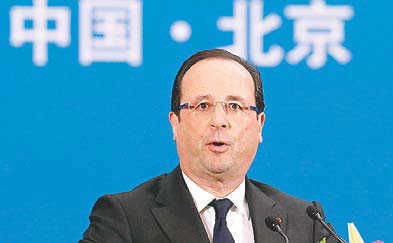Leaders oppose trade barriers
|
French President Francois Hollande makes a speech at the closing ceremony for the China-French Economic Forum at the Great Hall in Beijing on Thursday. Kim Kyung-Hoon / Agence France-Presse |
Leaders from China and France jointly stressed an anti-protectionism stance while calling for moves to facilitate mutual investment.
"We expect to resolve the problems emerging from cooperation through negotiations, and trade remedy measures should be used very prudently because what we want is a win-win result rather than losses on both sides," President Xi Jinping said at the closing ceremony of the China-France Economic Forum on Thursday.
Xi added that protectionism will not help the economic recovery in Europe or the world, nor will it benefit economic ties between China and France.
"We expect prudent resolutions to practical issues including market access, policy transparency and intellectual property protection so as to facilitate bilateral trade and investments," Xi said.
"Meanwhile, we hope China and France strengthen investment promotions and jointly advance the launching of talks for a China-Europe investment pact as soon as possible to reduce investment barriers, which will facilitate investments between China and France as well as China and Europe."
The European Union announced in November that it will investigate alleged government subsidies for Chinese solar panel manufacturers, in addition to an investigation started in September into China's alleged "dumping" of such products in European markets. A preliminary ruling is expected in early June.
The China-EU solar trade dispute will affect more than 400,000 Chinese workers, and "an improper handling of the case will definitely impact China-EU trade ties severely", said Chong Quan, deputy international trade representative with the Ministry of Commerce, in late March.
French President Francois Hollande, who started his first official visit to China on Thursday, said during the ceremony that he "firmly opposes protectionism in resolving trade imbalances".
Open markets urged
"We should resolve the trade imbalance at a political level and increase bilateral trade through opening the markets rather than closing markets or turning to a currency war," Hollande said.
Xi said that China is willing to import more products from France and expects France to "advance the EU to loosen the restraints on advanced exports to China".
China's trade with the debt-troubled EU dropped 1.9 percent from a year earlier to $124.41 billion in the first quarter of this year, accounting for 12.8 percent of its total trade, while the country's overall trade rose 13.4 percent, according to the General Administration of Customs.
France is China's fourth-largest trade partner in the EU while China is France's largest trade partner in Asia. Bilateral trade between China and France reached $11.23 billion in the first quarter of this year, declining 6.8 percent from a year earlier. Chinese exports dropped 6.7 percent to $5.96 billion, and imports went down 6.8 percent to $5.27 billion, according to the General Administration of Customs.
Xi encouraged enterprises from the world's second- and fifth-largest economies to jointly expand cooperation in other markets.
Hollande said: "We need China's growth to boost the development of Europe, and China also needs a strong Europe. Meanwhile, economic balance is very important."
In a January visit to Beijing, French Minister of Foreign Trade Nicole Bricq said that the French trade deficit with China reached 27 billion euros ($35.17 billion) in 2011, compared with the country's overall trade deficit of 74 billion euros.
Hollande added that the EU managed to remain stable and integrated, which is indispensable for the zone's economic growth. He called on the world, especially emerging economies, to have confidence in the EU's economic recovery.



















